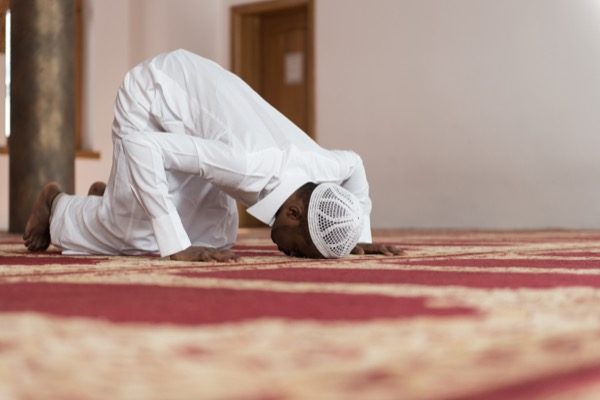
Azhar Goraya, Mexico
According to Islam, worship of God is of paramount importance. Not only is it the first commandment in the Holy Qur’an (2:22), but it is also the stated purpose of man´s creation. (51:57).
Nevertheless, this invites certain questions. Why should we worship God? Does God need us to worship him?
For some, such questions accompany a tyrannical image of God, presiding over an unwilling creation and demanding their obeisance for selfish and egotistical reasons.
Even worse, some may further reason that He is perhaps sustained in some way by the worship of His adherents, living off their devotions in a symbiotic or even parasitic fashion.
Islam rejects the above vision as utterly false. It presents God as Merciful and independent of His creation, and worship as something that is necessary and beneficial for man himself.
The Atheist and Agnostic Point of View
To the atheist and perhaps even agnostic, the idea of an All-Powerful God who requires worship is not just a blight on the character of God, but evidence against His very existence. Their thinking usually revolves around the following two points:
- Worship is a useless and derogatory act. How can a loving God demand such a degrading action from His creatures?
- If He insists that His creation worship Him, it must be out of a selfish need or want, both of which clash with His perfection. Either He is not as He is stated to be, or He does not exist.
The Dangers of Anthropomorphism
Before delving into the nature of God and worship, it is necessary to take a step back and address the idea ofanthropomorphism: attributing human motivations and emotions to non-human actors, in this case, to God.
Islam tells us that it is wrong to attribute human motivations and weaknesses to God. God is not like His creation. The Qur’an tells us:
لَیۡسَ کَمِثۡلِہٖ شَیۡءٌ
‘There is nothing whatever like unto Him’. [1]
Islam presents an image of God which is internally consistent and in harmony with His various attributes found throughout the Holy Qur’an.
Is God Dependent on Anything?
Let’s delve into the first issue at hand: the nature of God.
The Qur’an tells us that God is perfect. He is the creator of the universe, and is not dependent in any way on His creation:
لَہٗ مَا فِی السَّمٰوٰتِ وَ مَا فِی الۡاَرۡضِ ؕ وَ اِنَّ اللّٰہَ لَھُوَ الۡغَنِیُّ الۡحَمِیۡدُ
‘To Him belongs all that is in the heavens and all that is in the earth. And surely Allah is Self-Sufficient, Praiseworthy.’ [2]
Moreover, He is The First and the Last (57:4), as well as Al-Ahad (The One) (112:2). These attributes tell us that He is completely independent of other beings and phenomena. The Qur’an in one place states:
کُلُّ مَنۡ عَلَیۡھَا فَانٍ
وَّ یَبۡقٰی وَجۡہُ رَبِّکَ ذُو الۡجَلٰلِ وَ الۡاِکۡرَامِ
‘All that is on it will pass away.
And there will remain only the Person of thy Lord, Master of Glory and Honour.’ [3]
This means that there will come a time when all else, including human beings, cease to exist except God. This could not happen if God were dependent in some way on the worship of His creation.
Does God Need our Worship?
The question of whether God is dependent on our worship has been answered through the words of Prophet Moses (as) quoted in the Holy Qur´an:
وَ قَالَ مُوۡسٰۤی اِنۡ تَکۡفُرُوۡۤا اَنۡتُمۡ وَ مَنۡ فِی الۡاَرۡضِ جَمِیۡعًا ۙ فَاِنَّ اللّٰہَ لَغَنِیٌّ حَمِیۡدٌ
‘And Moses said, ‘If you disbelieve, you and those who are in the earth all together, you can do no harm to God; verily, Allah is Self- Sufficient, Praiseworthy.’ [4]
The Prophet Muhammad (sa) is reported to have stated in a Hadith that Allah states:
‘O My servants, I have forbidden oppression for Myself and have made it forbidden amongst you, so do not oppress one another…O My servants, you will never be able to harm me, nor will you be able to benefit Me. O My servants, if the first of you and the last of you, and the humans of you and the jinn of you, were all as pious as the most pious heart of any individual amongst you, then this would not increase My Kingdom an iota. O My servants, if the first of you and the last of you, and the humans of you and the jinn of you, were all as wicked as the most wicked heart of any individual amongst you, then this would not decrease My Kingdom an iota. O My servants, if the first of you and the last of you, and the humans of you and the jinn of you, were all to stand together in one place and ask of Me, and I were to give everyone what he requested, then that would not decrease what I Possess, except what is decreased of the ocean when a needle is dipped into it. O My servants, it is but your deeds that I account for you, and then recompense you for. So, he who finds good, let him praise Allah, and he who finds other than that, let him blame no one but himself.’ [5]
Does God have a Selfish Reason Behind Asking us to Worship Him?

If God doesn’t need our worship, then is it possible that he merely wants it for selfish reasons?
The idea of a selfish and egotistical God who cares not for His creation is one that is refuted by the Qur’an.
The very first verse of the Qur’an opens with God being presented as entirely Gracious and Merciful (1:1). He is Loving (11:91), a Friend (3:69), a Protector and Helper (22:79) as well as Gentle and Kind (22:64).
There are dozens of verses in the Qur’an that repeatedly renounce such thinking as it denigrates the true concept of God. In every case, God responds that He is far above the imperfections disbelievers attribute to Him. In one place He states:
وَ مَا قَدَرُوا اللّٰہَ حَقَّ قَدۡرِہٖ ٭ۖ وَ الۡاَرۡضُ جَمِیۡعًا قَبۡضَتُہٗ یَوۡمَ الۡقِیٰمَۃِ وَ السَّمٰوٰتُ مَطۡوِیّٰتٌۢ بِیَمِیۡنِہٖ ؕ سُبۡحٰنَہٗ وَ تَعٰلٰی عَمَّا یُشۡرِکُوۡنَ
‘And they do not esteem Allah, with the esteem that is due to Him. And the whole earth will be but His handful on the Day of Resurrection, and the heavens will be rolled up in His right hand. Glory to Him and exalted is He above that which they associate with Him.’ [6]
Moreover, He is not cruel and unjust (41:47). He is rewarding far beyond what is the right of His creatures (24:39).
He does not act based on vain and selfish desires. In one place He states:
مَاۤ اُرِیۡدُ مِنۡہُمۡ مِّنۡ رِّزۡقٍ وَّ مَاۤ اُرِیۡدُ اَنۡ یُّطۡعِمُوۡنِ
اِنَّ اللّٰہَ ہُوَ الرَّزَّاقُ ذُو الۡقُوَّۃِ الۡمَتِیۡنُ
‘I desire no sustenance from them, nor do I desire that they should feed Me.
Surely, it is Allah Himself Who is the Great Sustainer, the Powerful, the Strong.’ [7]
Meaning, he desires no type of sustenance, food or reward from His creation.
He has created the heavens and the earth as well as mankind according to the dictates of wisdom and for the lofty purpose of the pursuance of eternal truths. He states in the Qur’an:
وَ مَا خَلَقۡنَا السَّمَآءَ وَ الۡاَرۡضَ وَ مَا بَیۡنَھُمَا لٰعِبِیۡنَ
لَوۡ اَرَدۡنَاۤ اَنۡ نَّتَّخِذَ لَھۡوًا لَّاتَّخَذۡنٰہُ مِنۡ لَّدُنَّاۤ ٭ۖ اِنۡ کُنَّا فٰعِلِیۡنَ
بَلۡ نَقۡذِفُ بِالۡحَقِّ عَلَی الۡبَاطِلِ فَیَدۡمَغُہٗ فَاِذَا ھُوَ زَاھِقٌ ؕ وَ لَکُمُ الۡوَیۡلُ مِمَّا تَصِفُوۡنَ
‘And We created not the heaven and the earth and all that is between the two in play.
If We had wished to find a pastime, We would surely have found it in what is with Us if at all We were to do such a thing.
Nay, We hurl the truth at falsehood, and it breaks its head, and lo, it perishes. And woe be to you for that which you ascribe to God.’ [8]
Therefore, God is not a selfish and narcissistic tyrant demanding ego-inflating worship from His creations. Worship is for the benefit of man himself.
The Fallacy of All Requests Being Based on a Selfish Need or Want
Some may think that if God does not benefit at all from our worship, why then does He ask for and require our worship at all?
Firstly, many requests are not based upon personal need or selfishness. Rather, there are many that can be made based wholly upon the well-being of the other party.
When a policeman waves you through a traffic light, or a doctor asks you to take a specific medicine, or a teacher asks you to learn a certain concept, or a mother asks her child to eat – these are all requests given by someone who is in a position of authority, yet their requests do not have selfish motivations. There are many people who work sincerely and voluntarily for the benefit of others.
In the same way, God telling us to worship Him is out of the love He holds for His creation and His desire to benefit them. Moreover, the worship of God is the primary purpose of our existence, and it is through worship of God alone that man can attain the highest levels of self-development and progress by which he can feel satisfaction and completion.
Who Benefits from Worship?
Islam clarifies that it is man himself who is the sole beneficiary of his worship – God neither stands in need of his worship nor benefits from it in any way. The Qur’an tells us:
وَ مَنۡ جَاھَدَ فَاِنَّمَا یُجَاھِدُ لِنَفۡسِہٖ ؕ اِنَّ اللّٰہَ لَغَنِیٌّ عَنِ الۡعٰلَمِیۡنَ
‘And whoso strives, strives only for his own soul; verily Allah is Independent of all creatures.’ [9]
In another place God states:
فَاتَّقُوا اللّٰہَ مَا اسۡتَطَعۡتُمۡ وَ اسۡمَعُوۡا وَ اَطِیۡعُوۡا وَ اَنۡفِقُوۡا خَیۡرًا لِّاَنۡفُسِکُمۡ ؕ وَ مَنۡ یُّوۡقَ شُحَّ نَفۡسِہٖ فَاُولٰٓئِکَ ھُمُ الۡمُفۡلِحُوۡنَ
‘So fear Allah as best you can, and listen, and obey, and spend in His cause; it will be good for yourselves. And whoso is rid of the covetousness of his own soul — it is such who shall be successful.’ [10]
Man’s Dependance on God
Contrasting the independence of God, the Qur’an has highlighted the complete dependance of man upon God and the universe which He has created to sustain humankind. In one verse Allah states:
وَ اللّٰہُ الۡغَنِیُّ وَ اَنۡتُمُ الۡفُقَرَآءُ
‘…And Allah is Self- Sufficient, and it is you that are needy…’ [11]
In another place He states:
یُرِیۡدُ اللّٰہُ اَنۡ یُّخَفِّفَ عَنۡکُمۡ ۚ وَ خُلِقَ الۡاِنۡسَانُ ضَعِیۡفًا
‘Allah desires to lighten your burden, for man has been created weak.’ [12]
A little bit of reflection will bear this point out – man is completely dependent on external factors to maintain life. From the air he breathes, to the water he drinks and the food he eats, all must be provided for externally. Internally, there are thousands of diseases and complications that can bring an end to his life or reduce his life to one of complete misery and suffering. He is dependent on thousands of external factors for his wellbeing, all of which have been provided for by God.
Is Worshipping God Contrary to Equality and Freedom?
The words worship, obedience and subservience are sometimes seen as the antithesis of liberty, equality and freedom. Where the latter are seen as desirable and praiseworthy, the former are seen as harmful to the wellbeing of human beings.
Though that may be true to a certain extent in interpersonal human relations, where discrimination and injustice play a role, the same cannot be said of a relationship with God.
The affinity between man and a supreme Being cannot – by necessity – be a connection of two peers or equals.
Not only is God our Creator, but Islam teaches us that God is our greatest Benefactor, who has provided us the very universe that has paved the way for our creation and thereafter provided for us in countless ways. Moreover, He will raise us to life once again in the afterlife and judge us based on our beliefs and actions. The Qur’an in one place states:
وَ اٰتٰٮکُمۡ مِّنۡ کُلِّ مَا سَاَلۡتُمُوۡہُ ؕ وَ اِنۡ تَعُدُّوۡا نِعۡمَتَ اللّٰہِ لَا تُحۡصُوۡھَا ؕ اِنَّ الۡاِنۡسَانَ لَظَلُوۡمٌ کَفَّارٌ
‘And He gave you all that you wanted of Him; and if you try to count the favours of Allah, you will not be able to number them. Verily, man is very unjust, very ungrateful.’ [13]
Therefore, we are not only infinitely inferior in every way to God, we are also deeply and unceasingly indebted to Him for His past and continued favours and will be irresistibly returned before Him after our short sojourn in this life.
Keeping this in mind, a relationship based on equality, freedom and complete liberty is unrealistic when we gauge our relationship with God.
Yet despite this open reality, God has not desired that He reign like a tyrant over His creation. Rather, all of His actions in relation to us are based upon His two primary attributes – The Gracious and the Merciful (1:1).
Hazrat Mirza Ghulam Ahmad (as) (1835-1908) was the awaited reformer of this age. He claimed to be the Promised Messiah and Mahdi (divinely guided leader) prophesied to appear in the latter days to guide mankind towards God. He wrote extensively about the nature of God and our relationship with him, as well as the reality of true worship. He states in one place:
‘The attribute of love and compassion is a basic Divine attribute, and it is the mother of all other attributes. It is this very attribute that sometimes manifests itself in the form of awe and glory so as to bring about man’s reformation, and once the reformation has taken place, it assumes its original form and endures forever as a gift from God. God is not like an ill-tempered person who is fond of tormenting others. He is not cruel to anyone, rather men are cruel to themselves. All salvation lies in His love, and all torment lies in forsaking Him.’ [14]
In such a scenario, worship of God as a form of gratefulness and as a petition for His continued favour upon us, is not only acceptable and understandable, but is something that springs naturally from a discerning and humble heart.
About the Author: Azhar Goraya is a graduate from the Ahmadiyya Institute of Languages and Theology in Canada. He is currently serving as an Imam of the Ahmadiyya Muslim Community in Mexico. He is also the Central American Coordinator for The Review of Religions en Español.
ENDNOTES
[1] The Holy Qur’an 42:12
[2] The Holy Qur’an 22:65
[3] The Holy Qur’an 55:27-28
[4] The Holy Qur’an 14:9
[5] Sahih Muslim, The Book of Virtue, Enjoining Good Manners, and Joining of the Ties of Kinship,
Chapter: The Prohibition Of Oppression, Hadith #2577.
يَا عِبَادِي إِنِّي حَرَّمْتُ الظُّلْمَ عَلَى نَفْسِي وَجَعَلْتُهُ بَيْنَكُمْ مُحَرَّمًا فَلاَ تَظَالَمُوا۔۔۔يَا عِبَادِي إِنَّكُمْ لَنْ تَبْلُغُوا ضَرِّي فَتَضُرُّونِي وَلَنْ تَبْلُغُوا نَفْعِي فَتَنْفَعُونِي يَا عِبَادِي لَوْ أَنَّ أَوَّلَكُمْ وَآخِرَكُمْ وَإِنْسَكُمْ وَجِنَّكُمْ كَانُوا عَلَى أَتْقَى قَلْبِ رَجُلٍ وَاحِدٍ مِنْكُمْ مَا زَادَ ذَلِكَ فِي مُلْكِي شَيْئًا يَا عِبَادِي لَوْ أَنَّ أَوَّلَكُمْ وَآخِرَكُمْ وَإِنْسَكُمْ وَجِنَّكُمْ كَانُوا عَلَى أَفْجَرِ قَلْبِ رَجُلٍ وَاحِدٍ مَا نَقَصَ ذَلِكَ مِنْ مُلْكِي شَيْئًا يَا عِبَادِي لَوْ أَنَّ أَوَّلَكُمْ وَآخِرَكُمْ وَإِنْسَكُمْ وَجِنَّكُمْ قَامُوا فِي صَعِيدٍ وَاحِدٍ فَسَأَلُونِي فَأَعْطَيْتُ كُلَّ إِنْسَانٍ مَسْأَلَتَهُ مَا نَقَصَ ذَلِكَ مِمَّا عِنْدِي إِلاَّ كَمَا يَنْقُصُ الْمِخْيَطُ إِذَا أُدْخِلَ الْبَحْرَ يَا عِبَادِي إِنَّمَا هِيَ أَعْمَالُكُمْ أُحْصِيهَا لَكُمْ ثُمَّ أُوَفِّيكُمْ إِيَّاهَا فَمَنْ وَجَدَ خَيْرًا فَلْيَحْمَدِ اللَّهَ وَمَنْ وَجَدَ غَيْرَ ذَلِكَ فَلاَ يَلُومَنَّ إِلاَّ نَفْسَهُ (صحیح مسلم، كتاب البر والصلة والآداب، باب تَحْرِيمِ الظُّلْمِ، حدیث ۲۵۷۷)
[6] The Holy Qur’an 39:68
[7] The Holy Qur’an 51:58-59
[8] The Holy Qur’an 21:17-19
[9] The Holy Qur’an 29:7
[10] The Holy Qur’an 64:17
[11] The Holy Qur’an 47:39
[12] The Holy Qur’an 4:29
[13] The Holy Qur’an 14:35
[14] Chashma-e-Masihi, Ruhani Khazain vol. 20, pg. 370. Eng. Trans. Fountain of Christianity, pg. 46
۔۔۔ حقیقی صفت خدا تعالیٰ کی محبت اور رحم ہے اور وہی اُمُّ ا ّ لصفات ہے اور وہی کبھی انسانی اصلاح کے لئے صفات جلالیہ اور غضبیہ کے رنگ میں جوش مارتی ہے اور جب اصلاح ہو جاتی ہے توؔ محبت اپنے رنگ میں ظاہر ہو جاتی ہے اور پھر بطور موہبت ہمیشہ کے لئے رہتی ہے۔خدا ایک چڑچڑہ انسان کی طرح نہیں ہے جو خواہ نخواہ عذاب دینے کا شائق ہو۔ اور وہ کسی پر ظلم نہیں کرتا بلکہ لوگ اپنے پر آپ ظلم کرتے ہیں۔ اس کی محبت میں تمام نجات اور اس کو چھوڑنے میں تمام عذاب ہے۔ (چشمہ مسیحی، روحانی خزائن جلد ۲۰، صفحہ ۳۷۰)




Add Comment